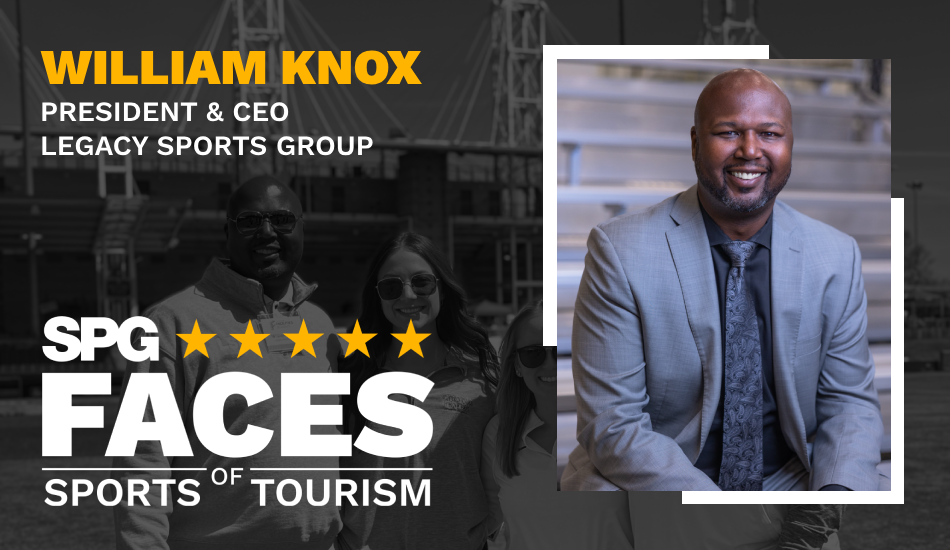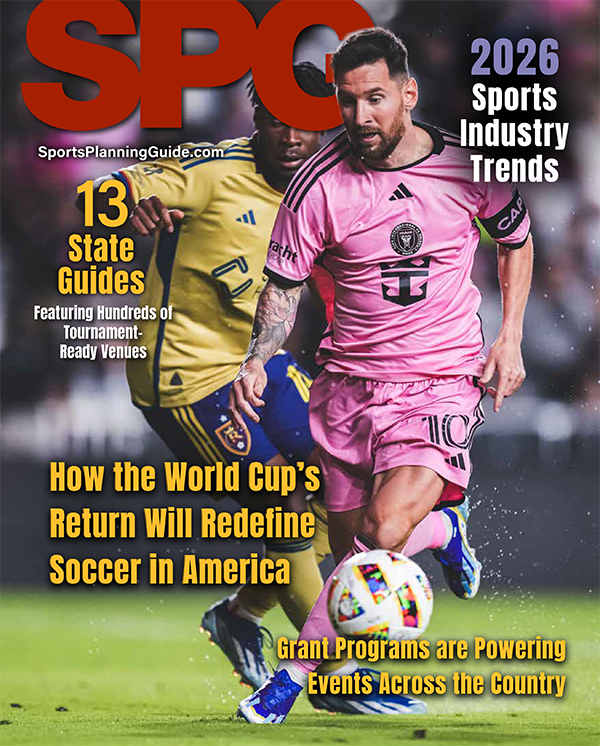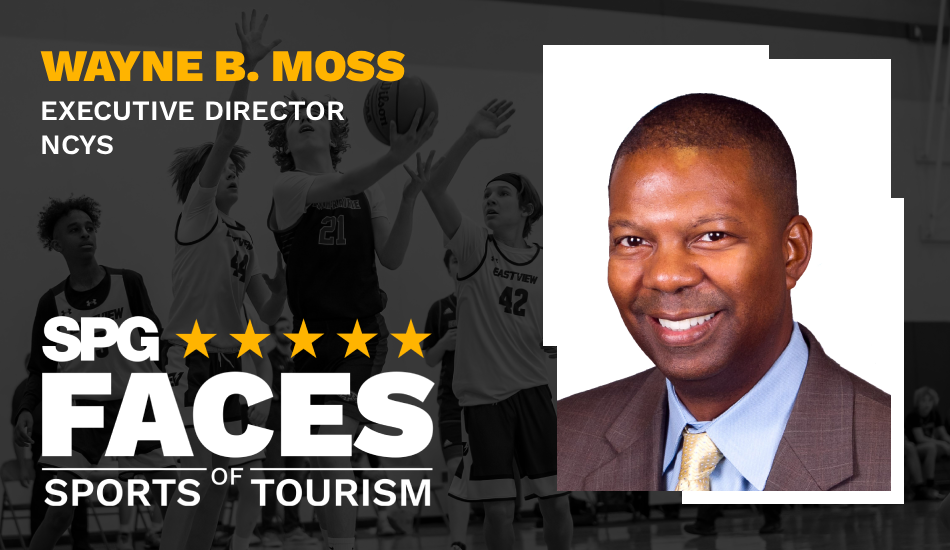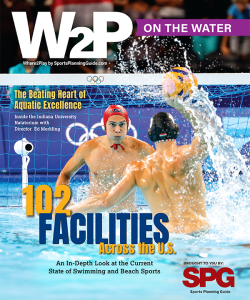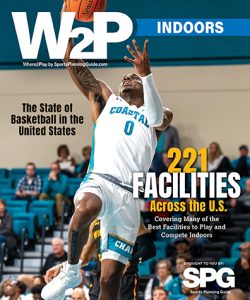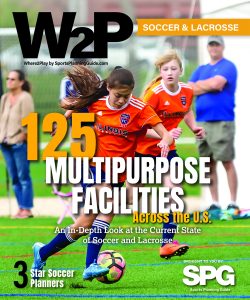Transforming communities through sports with Legacy Sports Group’s William Knox
William Knox’s career in sports tourism has been shaped by both legacy and opportunity. The son of former Chicago Bears player Bill Knox, he grew up immersed in athletics before channeling that passion into economic development through sports. His trajectory—from reviving Bloomington’s Sports Commission to spearheading the transformative Grand Park Sports Campus—demonstrates a consistent focus on how facilities and programming can uplift communities.
Now, as founder of Legacy Sports Group, Knox applies those hard-won lessons to help destinations nationwide harness youth sports as an engine for growth. In this interview, Knox discusses operational turning points, family collaboration and why venue-specific education fills a critical industry gap.
Read more exclusive content with Sports Planning Guide’s best practices!
Tell us about your background
I have carried a long time passion for sports. My father, William “Bill” Knox, who played for The Chicago Bears back in the 70s, instilled this passion in me from an early age and for as long as I can remember sport has been a key part of my life. While most of my father’s tenure with the Bears took place prior to my birth, its lasting impact has influenced how I view sport and the business behind it.
I was born and raised in Gary, Indiana, and played a variety of sports throughout childhood, including basketball, baseball, football and golf. I went on to attend Indiana University in Bloomington where I studied sports management. After graduating, I secured a position at the Bloomington Indiana CVB where I started my professional career in the sports tourism industry. While there, I was empowered by my boss, Valerie Penna, to reinstate the Bloomington Sports Commission in 2002. In all, I spent a total of 14 years in Bloomington, 10 of them working for the CVB and Sports Commission.
In 2009, I moved to central Indiana to assist the Hamilton County Tourism Bureau in launching their own sports commission. At that point, the City of Westfield was dreaming big. Mayor Andy Cook proposed that sport tourism be the city’s economic driver, and so the original concept for Grand Park Sports Campus was birthed. At the time, the proposed concept was to build a multipurpose soccer and baseball/softball complex, and by building this the city would stake their claim in the sports tourism industry.
Through my role at Hamilton County Tourism and the Hamilton County Sports Commission, I was fortunate to contribute to the planning and development of the Grand Park Sports Campus concept and, four years later, the first shovel broke ground on a 400-acre plot of land with plans to build 26 diamonds, 31 multipurpose fields and, eventually, a 377,000-square-foot events center. At the time, I never imagined that Mayor Cook would ask me to step up and transition into the role of Grand Park Director. He charged me with ensuring the operation of the campus was efficient, sustainable and contributed to the quality of life of Westfield Residence.
Reflecting back over the past 25 years, these people and milestone life events have shaped who I am and have affirmed that the business of sport is my true passion.
Could you share insights into your tenure managing Grand Park, the largest sports complex in the U.S., and how that experience has shaped the foundation and your leadership at Legacy Sports Group?
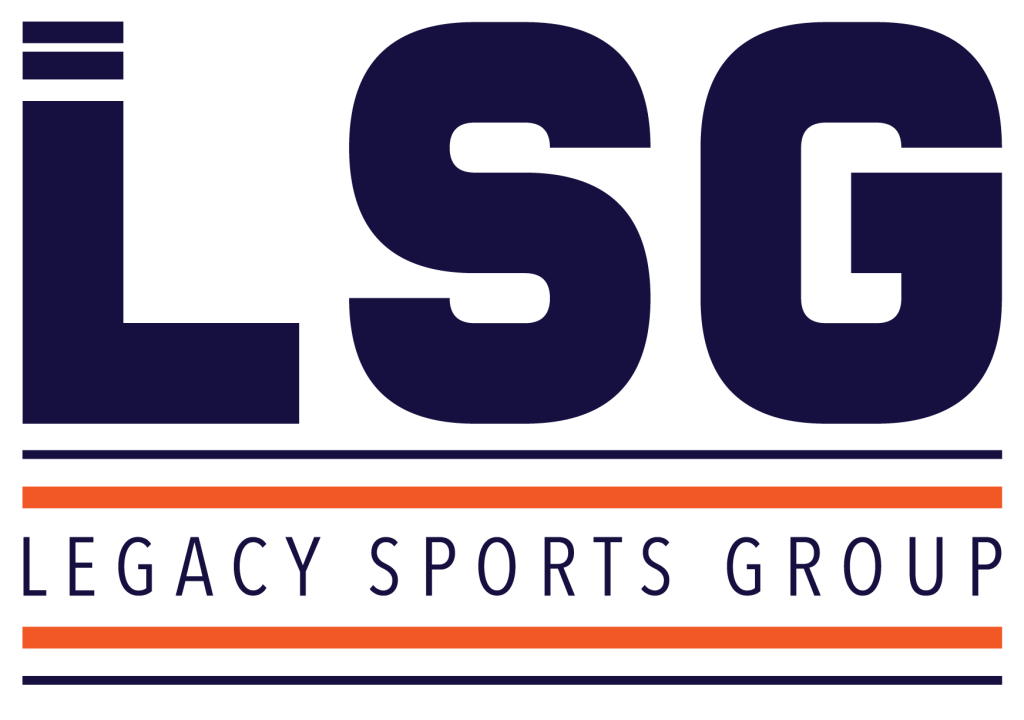
Throughout my five-year tenure as director, I oversaw a significant transformation of the operation of the sports campus. At the time I joined the team, the campus had been operational for two years but not yet generating profit. The city understood that achieving profitability would require time, but we recognized the necessity for operational changes to reach self-sustainability.
Over the subsequent five years, we implemented a series of strategic initiatives. We introduced operational efficiencies to streamline processes and optimize resource allocation. By insourcing services, we reduced costs and enhanced control over critical functions. Renegotiating foundational agreements allowed us to secure more favorable terms and improve financial outcomes. Additionally, we cultivated partnerships with key stakeholders to foster collaboration and leverage external support.
Through these concerted efforts we achieved a remarkable change, and by the end of 2019 the campus had transitioned to a profitable operation. While managing the campus was undoubtedly a rewarding experience, witnessing the transformative impact of sport on Westfield and Hamilton County was even more gratifying. The economic benefits, community engagement and enhanced quality of life were testaments to the power of sports tourism.
Legacy Sports Group aims to transform destinations through sport and emerge as a leading authority at the intersection of youth sports and economic development. Can you elaborate on how your group is working towards these goals?
The transformative power of sports on communities is immense, and at Legacy Sports Group our mission centers on collaborating with communities to pinpoint their distinct qualities and potential avenues for development through youth sports. Our strategic recommendations don’t always involve constructing massive sports complexes. In fact, we often find that aligning our strategies with existing local sports programming can be just as effective in achieving a community’s overarching goals and objectives.
For instance, enhancing local sports programs might involve upgrading existing sports facilities, or creating new opportunities for youth participation in sports. These efforts can lead to a wide range of community benefits, including increased physical activity and health among young people, enhanced social and emotional development and greater community engagement.
Furthermore, by identifying and leveraging the unique qualities and opportunities within each community, we can develop tailored sports-based initiatives that not only promote youth development but also contribute to broader community development goals, such as economic revitalization, tourism promotion and social cohesion.
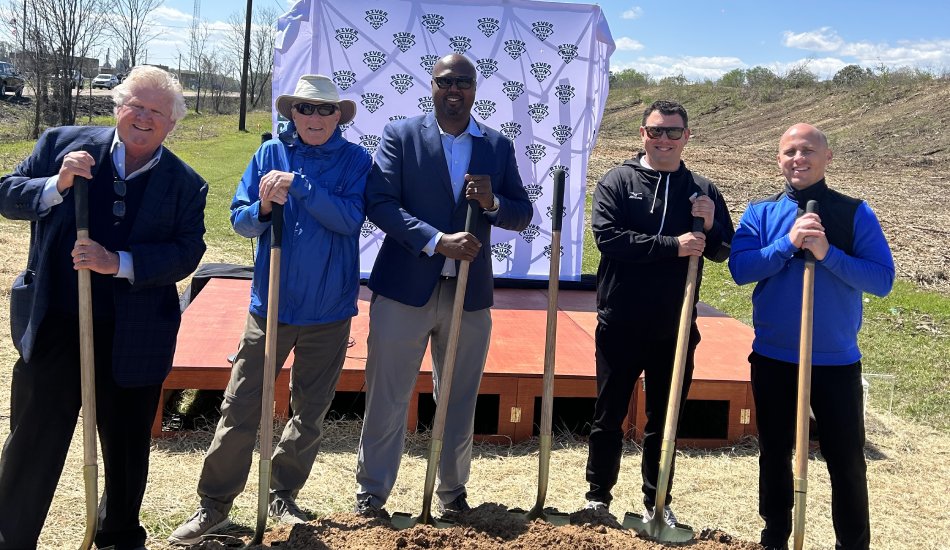
Knox (center) at the groundbreaking of the new River Run Park sports complex.
How has family influenced your business philosophy?
My family is the cornerstone of my life, and my wife and children’s unwavering support is what makes my work possible. Each of my children plays a unique and vital role in the business. My daughter, with her entrepreneurial spirit, has been an invaluable asset, assisting with numerous events and even supplying staff apparel through her own company. My two sons, both innovative and insightful, are key members of the research and development team. Their contributions are essential as they help me generate fresh ideas for sports events and stay attuned to the ever-changing interests of today’s youth. Their involvement ensures that our strategies and events remain relevant and engaging for the younger generation.
How do you balance the demands of leading a company like Legacy Sports Group with personal commitments, and what strategies have you found effective in maintaining this balance?
Maintaining a healthy work-life balance can be quite difficult, especially in such a demanding field. I am incredibly fortunate to have a strong support system in my family and a dedicated team who are all committed to the success of Legacy Sports Group. This shared commitment helps tremendously.
While there are times when my work life and personal life blend together, I am thankful that I can experience my work through my children’s participation in sports. This creates a unique connection between my professional and personal life, which I cherish. However, I also understand the importance of setting aside dedicated time for rest and relaxation, and quality time with my family. This allows me to recharge and ensures that I can continue to lead effectively and serve our communities to the best of my ability.
It’s a constant juggling act, but I believe that with the support of loved ones, clear priorities and a commitment to selfcare, it is possible to find a balance that allows for both personal fulfillment and professional success.
What inspired you and the Legacy Sports Group team to develop the Sports Venue Forum (SFV), and how did the collaboration with the US Sports Congress come about?
There is a wealth of educational resources that cater to a wide array of professionals within the sports tourism industry, but I felt that there was a gap in educational opportunities tailored for venue professionals specifically. This realization was affirmed through my additional research and that’s why I worked with Sports ETA to create the Facility Summit. It became evident that there was a strong demand for expanded educational offerings focused on this particular niche.
Recognizing this unmet need, I proactively sought collaboration with Lou Mengsol, president and owner of US Sports Congress. Together, we devised a strategy to co-locate our conferences, effectively combining our resources and expertise to provide a comprehensive educational platform that directly addressed the educational gap for venue professionals. This collaborative effort proved highly successful in fulfilling the demand for specialized content and fostering professional development within the venue management sector of the sports tourism industry.
How do you envision the SFV contributing to the advancement of best practices and innovation within the industry?
SVF serves as a key part of the ecosystem within the sports tourism industry, fostering a collaborative environment and promoting industry best practices. By facilitating opportunities for open conversation and collaboration, providing networking opportunities and educational content, SVF empowers industry professionals to make informed decisions and promotes growth within the sports tourism sector, particularly in the venue development and management space.
SFV enables strangers to become colleagues and provides them with the opportunity to exchange ideas, share experiences, and explore innovative solutions to common challenges. This open exchange of information and sharing of best practices encourages collaboration among sports tourism stakeholders.
By focusing specifically on sports venues, SVF addresses the unique needs and challenges associated with these venues. This targeted approach ensures that the content and discussions are relevant and valuable to those involved in the planning, design, construction, operation, and management of sports venues. Ultimately, this plays a pivotal role in shaping the future of sports tourism by promoting collaboration, innovation and informed decision-making.
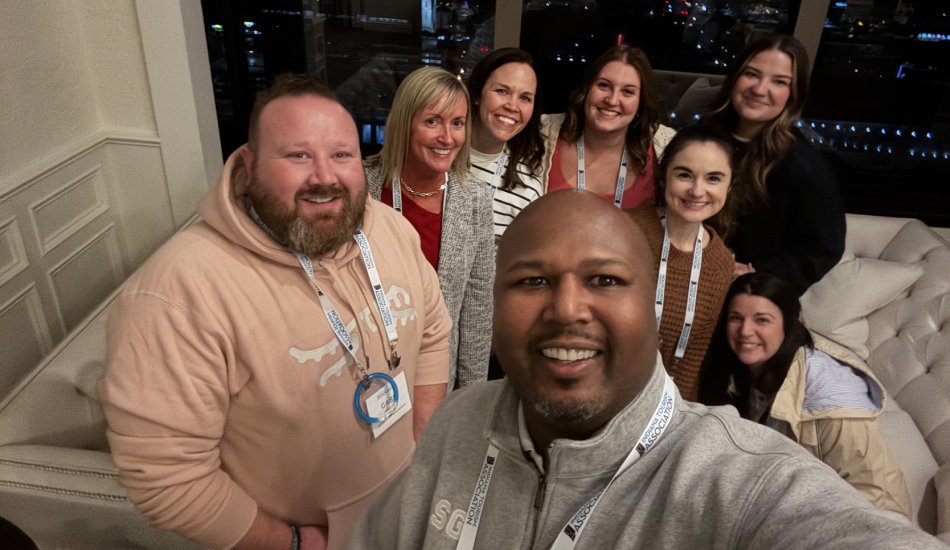
Knox with fellow attendees from Indiana Tourism Association.
Based on your extensive experience, what trends do you foresee in the sports tourism industry, particularly when it comes to technological improvements, and how is Legacy Sports Group preparing to adapt to these changes?
Technology is integral to every industry, and sports tourism is no exception. The future of sports tourism technology is full of possibilities. Advancements in ball tracking, for example, can provide real-time data and statistics, enhancing the spectator experience and potentially aiding in coaching and player development. AI-generated game production could revolutionize broadcasting, offering new perspectives and potentially reducing production costs. Virtual and augmented reality could allow fans to experience games and events in immersive new ways, whether they’re in the stadium or watching from home. Data analytics and machine learning can also provide valuable insights into fan behavior and preferences, helping venues and organizers optimize their offerings and personalize the fan experience.
Legacy Sports Group is committed to being a leader in helping communities evaluate and select the best technology options for their projects, ensuring that they stay ahead of the curve and maximize the benefits of technological advancements in the sports tourism industry. This includes not only understanding the current technological landscape but also anticipating future trends and developments, so that communities can make informed decisions that will support their long-term goals and objectives.
What is your favorite sport to play or watch?
Football!
Who do you root for?
I inherently root for the Chicago Bears and always will, but my wife and kids are Indianapolis Colts fans. I also call many Colts staff members friends, which causes me to have a deeper connection to the team and see their success. I am also a lifelong IU fan—especially when they’re playing Purdue.
But who I root for on the daily are my kids. I am their biggest cheerleader in everything they set out to accomplish.

